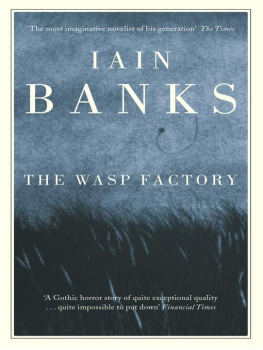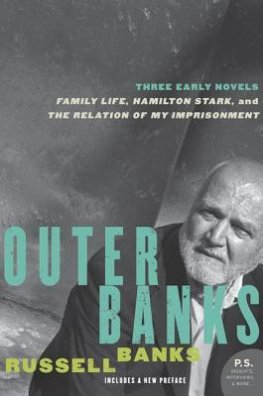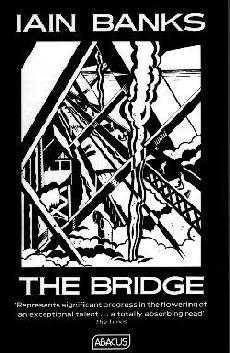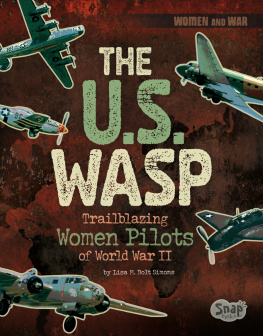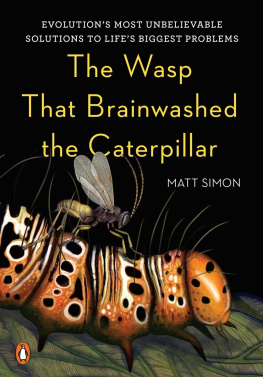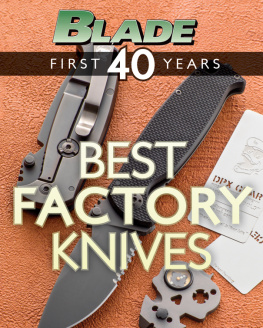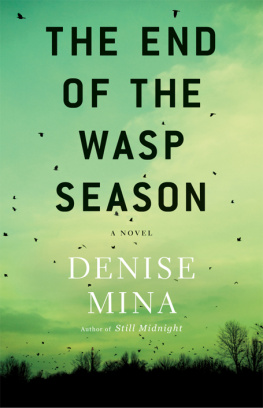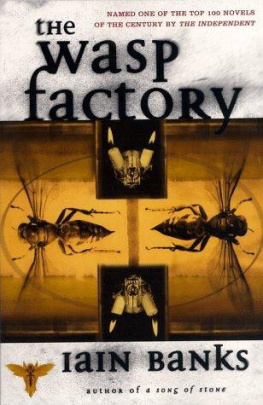Ian Banks - The Wasp Factory
Here you can read online Ian Banks - The Wasp Factory full text of the book (entire story) in english for free. Download pdf and epub, get meaning, cover and reviews about this ebook. year: 2009, publisher: Hachette Digital, genre: Art / Prose. Description of the work, (preface) as well as reviews are available. Best literature library LitArk.com created for fans of good reading and offers a wide selection of genres:
Romance novel
Science fiction
Adventure
Detective
Science
History
Home and family
Prose
Art
Politics
Computer
Non-fiction
Religion
Business
Children
Humor
Choose a favorite category and find really read worthwhile books. Enjoy immersion in the world of imagination, feel the emotions of the characters or learn something new for yourself, make an fascinating discovery.
The Wasp Factory: summary, description and annotation
We offer to read an annotation, description, summary or preface (depends on what the author of the book "The Wasp Factory" wrote himself). If you haven't found the necessary information about the book — write in the comments, we will try to find it.
The Wasp Factory — read online for free the complete book (whole text) full work
Below is the text of the book, divided by pages. System saving the place of the last page read, allows you to conveniently read the book "The Wasp Factory" online for free, without having to search again every time where you left off. Put a bookmark, and you can go to the page where you finished reading at any time.
Font size:
Interval:
Bookmark:
Table of Contents
Iain Banks sprang to widespread and controversial public notice with the publication of his first novel, The Wasp Factory , in 1984. Since then he has gained enormous and popular critical acclaim with further works of both fiction and science fiction, all of which are available in either Abacus or Orbit paperbacks. In 1993 he was acknowledged as one of the Best of Young British Writers. In 1996 his number one bestseller, The Crow Road was adapted for television. The Times has acclaimed Iain Banks the most imaginative British novelist of his generation.
Iain Banks lives in Fife, Scotland
By Iain Banks
THE WASP FACTORY
WALKING ON GLASS
THE BRIDGE
ESPEDAIR STREET
CANAL DREAMS
THE CROW ROAD
COMPLICITY
WHIT
A SONG OF STONE
THE BUSINESS
DEAD AIR
THE STEEP APPROACH TO GARBADALE
And as Iain M. Banks
CONSIDER PHLEBAS
THE PLAYER OF GAMES
USE OF WEAPONS
THE STATE OF THE ART
AGAINST A DARK BACKGROUND
FEERSUM ENDJINN
EXCESSION
INVERSIONS
LOOK TO WINDWARD
THE ALGEBRAIST
MATTER
The Wasp Factory
IAIN BANKS
Hachette Digital
www.littlebrown.co.uk
Published by Hachette Digital 2008
Copyright Iain Banks 1984
All rights reserved.
No part of this publication may be reproduced,
stored in a retrieval system, or transmitted, in any
form or by any means, without the prior
permission in writing of the publisher, nor be
otherwise circulated in any form of binding or
cover other than that in which it is published and
without a similar condition including this
condition being imposed on the subsequent purchaser.
All characters in this publication are fictitious
and any resemblance to real persons, living or dead,
is purely coincidental.
A CIP catalogue record for this book
is available from the British Library.
ISBN 978 0 7481 0995 1
This ebook produced by JOUVE, FRANCE
Hachette Digital
An imprint of
Little, Brown Book Group
100 Victoria Embankment
London EC4Y 0DY
An Hachette Livre UK Company
for Ann
The Sacrifice Poles
I had been making the rounds of the Sacrifice Poles the day we heard my brother had escaped. I already knew something was going to happen; the Factory told me.
At the north end of the island, near the tumbled remains of the slip where the handle of the rusty winch still creaks in an easterly wind, I had two Poles on the far face of the last dune. One of the Poles held a rat head with two dragonflies, the other a seagull and two mice. I was just sticking one of the mouse heads back on when the birds went up into the evening air, kaw-calling and screaming, wheeling over the path through the dunes where it went near their nests. I made sure the head was secure, then clambered to the top of the dune to watch with my binoculars.
Diggs, the policeman from the town, was coming down the path on his bike, pedalling hard, his head down as the wheels sank part way into the sandy surface. He got off the bike at the bridge and left it propped against the suspension cables, then walked to the middle of the swaying bridge, where the gate is. I could see him press the button on the phone. He stood for a while, looking round about at the quiet dunes and the settling birds. He didnt see me, because I was too well hidden. Then my father must have answered the buzzer in the house, because Diggs stooped slightly and talked into the grille beside the button, and then pushed the gate open and walked over the bridge, on to the island and down the path towards the house. When he disappeared behind the dunes I sat for a while, scratching my crotch as the wind played with my hair and the birds returned to their nests.
I took my catapult from my belt, selected a half-inch steelie, sighted carefully, then sent the big ball-bearing arcing out over the river, the telephone poles and the little suspension bridge to the mainland. The shot hit the Keep Out - Private Property sign with a thud I could just hear, and I smiled. It was a good omen. The Factory hadnt been specific (it rarely is), but I had the feeling that whatever it was warning me about was important, and I also suspected it would be bad, but I had been wise enough to take the hint and check my Poles, and now I knew my aim was still good; things were still with me.
I decided not to go straight back to the house. Father didnt like me to be there when Diggs came and, anyway, I still had a couple of Poles to check before the sun went down. I jumped and slid down the slope of the dune into its shadow, then turned at the bottom to look back up at those small heads and bodies as they watched over the northern approaches to the island. They looked fine, those husks on their gnarled branches. Black ribbons tied to the wooden limbs blew softly in the breeze, waving at me. I decided nothing would be too bad, and that tomorrow I would ask the Factory for more information. If I was lucky, my father might tell me something and, if I was luckier still, it might even be the truth.
I left the sack of heads and bodies in the Bunker just as the light was going completely and the stars were starting to come out. The birds had told me Diggs had left a few minutes earlier, so I ran back the quick way to the house, where the lights all burned as usual. My father met me in the kitchen.
Diggs was just here. I suppose you know.
He put the stub of the fat cigar he had been smoking under the cold tap, turned the water on for a second while the brown stump sizzled and died, then threw the sodden remnant in the bin. I put my things down on the big table and sat down, shrugging. My father turned up the ring on the cooker under the soup-pan, looking beneath the lid into the warming mixture and then turning back to look at me.
There was a layer of grey-blue smoke in the room at about shoulder level, and a big wave in it, probably produced by me as I came in through the double doors of the back porch. The wave rose slowly between us while my father stared at me. I fidgeted, then looked down, toying with the wrist-rest of the black catapult. It crossed my mind that my father looked worried, but he was good at acting and perhaps that was just what he wanted me to think, so deep down I remained unconvinced.
I suppose Id better tell you, he said, then turned away again, taking up a wooden spoon and stirring the soup. I waited. Its Eric.
Then I knew what had happened. He didnt have to tell me the rest. I suppose I could have thought from the little hed said up until then that my half-brother was dead, or ill, or that something had happened to him, but I knew then it was something Eric had done, and there was only one thing he could have done which would make my father look worried. He had escaped. I didnt say anything, though.
Eric has escaped from the hospital. That was what Diggs came to tell us. They think he might head back here. Take those things off the table; Ive told you before. He sipped the soup, his back still turned. I waited until he started to turn round, then took the catapult, binoculars and spade off the table. In the same flat tone my father went on, Well, I dont suppose hell get this far. Theyll probably pick him up in a day or two. I just thought Id tell you. In case anybody else hears and says anything. Get out a plate.
I went to the cupboard and took out a plate, then sat down again, one leg crossed underneath me. My father went back to stirring the soup, which I could smell now above the cigar smoke. I could feel excitement in my stomach - a rising, tingling rush. So Eric was coming back home again; that was good-bad. I knew hed make it. I didnt even think of asking the Factory about it; hed be here. I wondered how long it would take him, and whether Diggs would now have to go shouting through the town, warning that the mad boy who set fire to dogs was on the loose again; lock up your hounds!
Next pageFont size:
Interval:
Bookmark:
Similar books «The Wasp Factory»
Look at similar books to The Wasp Factory. We have selected literature similar in name and meaning in the hope of providing readers with more options to find new, interesting, not yet read works.
Discussion, reviews of the book The Wasp Factory and just readers' own opinions. Leave your comments, write what you think about the work, its meaning or the main characters. Specify what exactly you liked and what you didn't like, and why you think so.

